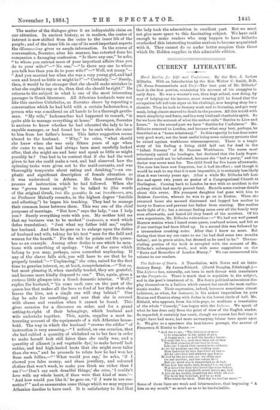The Inferno of Dante. A Translation, with Notes and an
Intro- ductory Essay. By James Sibbald. (David Douglas, Edinburgh.)— The Inferno has, naturally, not been in such favour with translators as the Purgatorio. There is much that is repulsive in the subject, and in the poet's treatment of it. His fierce political animosities dis- play themselves in a fashion which cannot but revolt the most enthu- siastic reader. Their expression, indeed, becomes sometimes almost ludicrous, as when, for instance, in his ardent imperialism he puts Brutus and Cassius along with Judas in the lowest circle of hell. Mr. Sibbald, who appears, from his title-page, to meditate a translation of the whole " Comedy," has begun with the Inferno. We speak of what he has done only from the point of view of the English reader. So regarded, it certainly has merit, though we cannot but feel that it might have had more, had more unwearying labour been spent upon it. We give as a specimen the best-known passage, the answer of Francesca di Rimini to Dante :- " And she to me : ' The bitterest of Wrei Is to remember in the midst of pain A happy past ; as well thy.tescher knows. Yet none the less, and since thou art so fain The first occasion of our love to bear, Like one I speak that cannot tears 1 estraiu. As we for pastime one day reading were How Lancelot by love was tette:ad fast—All by ourselves and without any fear—
Moved by the Lao our eye+ we often cast On one another, and our colour fie 1; But one word was it vanquished ua at last.
When how the smile, long wearied fir, we read Was kissed by him who loved like none before.
This one who henceforth never leaves me, laid A kiss on my month, trembling the while all o'er. The bcok was Galahad, and be a+ well Who wrote the book. That day we real no more.'"
Some of these lines are weak and inharmonious, that beginning " A kiss on my mouth" so much so as to be inadmissible.














































 Previous page
Previous page